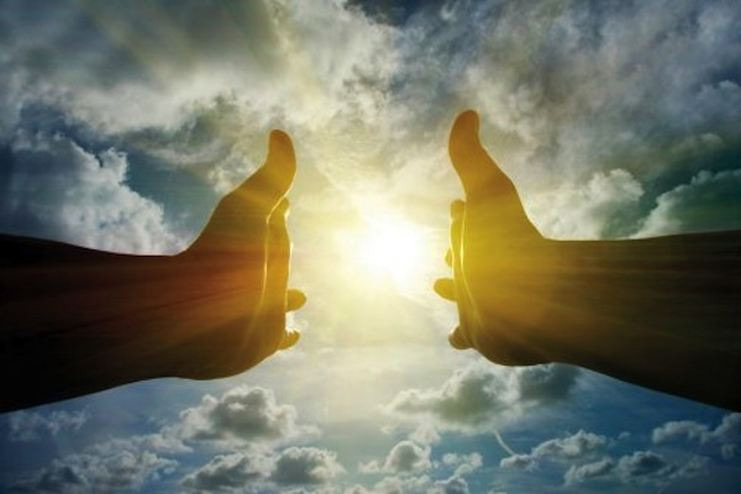
When the Celebrant places into the Holy Chalice all the portions of the Saints, the Deacon reminds him: "Exalt, Master." At the Royal Doors the Holy Chalice is raised towards the people, who reverently bow down praising God: "Blessed is our God always...". He then transfers it to the Table of Oblation, where it is not visible to the faithful and in such a way brings to mind the glorious Ascension of our Lord to the heavens, and thus also the incense represents the cloud of Angels who accompanied Him to Heaven
With the end of the communion of the believers we have reached the end of the Eucharistic Mystery. Full of gratitude we all sing together the first part of Psalm 71:8[70 LXX]: "Let my mouth be filled with thy praise and with thy honour all the day." We are not able, O Lord, it says, to offer You even a hymn for all the good things you have gifted to us, but You give to us this too. How? Filling our mouth with praise. You bless those who pray, that they may know how we ought to pray, so give me sthe strength to praise you worthily.
We continue to give thanks. The exhortation is addressed by the Deacon, who exclaims: "Arise! Having partaken of the divine, holy, pure… Mysteries of Christ, let us worthily give thanks to the Lord.".
The Celebrant reads the Prayer of Thanksgiving: "We give thanks to You, Master Who loves mankind, benefactor of our souls, that even on this very day You have made us worthy of Your heavenly and immortal Mysteries..."
This giving of thanks brings to mind the corresponding thanksgiving that the Disciples of Christ did at the end of the Last Supper: "When they had sung a hymn, they went out to the Mount of Olives" (Matthew 26:30). This prayer of the Divine Liturgy is a symbol of that primordial prayer. The Lord gave thanks before giving the Disciples His holy Body, to teach us to give thanks as well. And after he gave it to them again, he thanked and praised, so that we could do the same.
Believers who take part in the sacramental supper of the Church, see their hearts warmed by the divine Love they received within them.
But let us pay particular attention to a word from the Deacon's exhortation: "Let us worthily thank the Lord", because it contains a very deep meaning. Indeed, are we fully aware of the fact that every time we commune we ought to worthily thank the Lord for His supreme gift? Unfortunately, there are people who after communing do not even think that they should thank God, and in fact some exit the church before the Divine Liturgy ends. Tgis is unacceptable behavior for a Christian. The benefits he will receive from the fearful Mystery will depend on the Christian's attitude towards the "Let us worthily thank the Lord". The inner warmth with which we will address our thanks after the divine Communion measures the degree of our gratitude. If one does not even feel the need to thank the Lord for the highest honor of him giving himself for us, then how is it possible for the Lord who condemned the ingratitude of the nine cured lepers, to remain in ones heart?
Let us contemplate the love of our Lord who gave His life for us, and return our love to Him, thanking our Lord with all the power of our souls, with all our hearts, and all our mind.
The Prayer of Thanksgiving that the Celebrant recites expresses the warm gratitude of all the faithful, for the invaluable gift of the Last Supper and we ask the Lord to guide us in the course of our life, to maintain faith and reverence towards the Triune God, to guard our life from visible and invisible enemies, and bless every good effort that we make.
At this point let us remember that our gratitude is not limited to this short thank-you note. That is why our Fathers made a collection of Prayers and troparions which constitute the Service of the Divine Communion, which is divided into four parts. The first three parts are read by the believer before the Divine Communion. The fourth and last is read by everyone who has communed and actually helps us to feel sacred awe and immense gratitude to God. This Service is independent of the Divine Liturgy and the faithful can read it in the quiet of their home.
Let us recall two wishes from the Service of Holy Communion. The first is said shortly before Holy Communion.
"Thou hast sweetened me with Thy love, O Christ, and by Thy Divine zeal hast Thou changed me. But do Thou consume my sins with immaterial fire and vouchsafe me to be filled with delight in Thee; that, leaping for joy, O Good One, I may magnify Thy two comings".
With simple words we would say: Lord, Your love filled me with joy, and by thy divine love I'm changed. Please burn with your divine fire my sins...". With such divine love we ought to turn to the Lord.
And the prayer of thanksgiving after the Holy Communion says the following:
"Grant that they [the Holy Gifts] may be for me also unto the healing of soul and body… And thus, when this life is ended in the hope of eternal life, I may attain unto everlasting rest, where the voice of those who keep festival is unceasing, and the delight of those who behold the ineffable beautify of thy countenance is boundless".
When the Lord provides us with so many blessings how will not our souls feel eternal gratitude and wish to sing "I pray to the Lord all my life, sing to my God as long as I live!" Amen.





